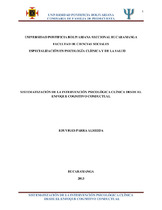Sistematización de la intervención psicológica clínica desde el enfoque congnitivo conductual
Fecha
2013Autor
Parra Almeida, Eduviges
Director/Asesor
Durán Mosquera, Amparo
Tipo de contenido
Especialización
Citación
Metadatos
Mostrar el registro completo del ítemDocumentos PDF
Resumen
El presente estudio expone un caso de depresión de origen exógeno, cuyo comienzo está dado por la ruptura de una relación amorosa, que se reflejó en conductas que alteraron la dinámica funcional del consultante. Se formalizó un trabajo flexible que abarcó al paciente como portador de los síntomas y a su familia extensa, a fin de fortalecer el vínculo afectivo y establecer redes de apoyo que permitieran favorecer el proceso terapéutico. A su vez, es un estudio descriptivo, extrínseco de caso, con diseño no experimental, donde se logró en el paciente la abolición de gran parte de los síntomas y que fuera funcional en las distintas áreas de su vida, clarificando y fortaleciendo su proyecto de vida, mejorando sus relaciones con algunos de sus familiares y modificando pensamientos automáticos distorsionados que le estaban generando síntomas de depresión, ansiedad y baja autoestima, los cuales afectaban directamente su estabilidad emocional y física. En la evaluación pre tratamiento se aplicaron los Inventarios de depresión y Ansiedad de Beck, Pensamientos Automáticos Distorsionados y Escala de Autoestima de Rosenberg, los cuales dieron cuenta que el paciente presentaba un trastorno de adaptación mixto con ansiedad y estado de ánimo depresivo, producto de la ruptura de una relación amorosa, de presentar dificultad en la comunicación y relación con sus padres, dificultad para establecer relaciones adecuadas con los otros y hallarse desorientado en su proyecto de vida, llevándolo a intentar suicidarse, razón por la cual tuvo que ser hospitalizado y tratado con medicación; la evaluación post tratamiento se interpreta de los resultados que se logró en buena parte reestructurar cognitivamente sus pensamientos distorsionados, mejorar su estado emocional y adquirir herramientas para saber enfrentarse a los problemas de la vida, lo anterior fue posible a través intervención psicológica desde el enfoque cognitivo conductual, haciendo uso de las técnicas de restructuración cognitiva, entrenamiento en habilidades de comunicación, sociales, resolución de problemas y toma de decisiones, técnicas de relajación autógena y respiración diafragmática, técnicas de Mindfulness de reducción de rumiación y preocupación, anclaje en el presente y tolerancia al malestar y técnicas de control somático (regulación emocional —reparación emocional). This study presents a case of depression of exogenous origin, whose beginning is given by the breakdown of a relationship, which was reflected in behaviors that alter the functional dynamics of the consultant. Was formalized flexible work covering the patient as symptoms and their extended family, to strengthen the bond and build support networks that allow foster the therapeutic process. In turn, it is a descriptive study, extrinsic case with non-experimental design, which was achieved in the patient the abolition of most of the symptoms and to be functional in the different areas of your life, clarifying and strengthening its draft life, improving your relationships with some of his relatives and modifying distorted automatic thoughts that were causing symptoms of depression, anxiety and low self-esteem, which directly affect emotional and physical stability. In the pre-treatment assessment were applied Anxiety Inventory and Beck Depression, Distorted Automatic Thoughts and Rosenberg Self-Esteem Scale, which realized that the patient had an adjustment disorder with mixed anxiety and depressed mood, due to the breakup of a relationship, to present difficulty in communication and relationship with their parents, difficulty in establishing appropriate relationships with others and be disoriented in their life plan, leading him to attempt suicide, why was hospitalized and treated with medication, the post-treatment evaluation of results is interpreted to be achieved largely cognitively restructure their distorted thinking, improve your emotional state and acquire the tools to learn to face the problems of life, the above was possible through psychological intervention from cognitive behavioral approach, using cognitive restructuring techniques, communication skills training, social, problem-solving and decision-making, relaxation techniques, autogenous and diaphragmatic breathing Mindfulness techniques to reduce rumination and worry, anchor the present and distress tolerance and somatic control techniques (emotional regulation - emotional repair).
Palabra/s clave
Psicología
Cognición
Depresión mental
Ansiedad
Autoestima
Colecciones
- Trabajos de grado [6698]
El ítem tiene asociados los siguientes ficheros de licencia:


